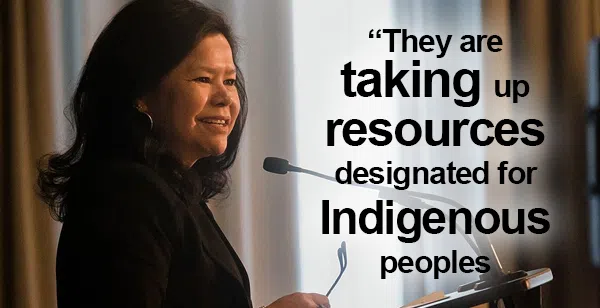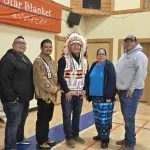
Understanding the impacts of pretendianism in academia
The First Nations University of Canada, in partnership with the National Indigenous University Senior Leaders’ Association (NIUSLA), hosted the second national forum on Indigenous identity fraud.
Last year the topic was Indigenous identity and this year the conversations were about Indigenous citizenship.
“The primary focus again is trying to find ways forward in relation to addressing identity fraud within post-secondary institutions and affirming Indigenous identity, or citizenship, or membership and lived experience,” said FNUniv President Jacqueline Ottmann.
She said this conversation is critical even though identity fraud has been happening for centuries for various reasons.
“Especially after the Truth and Reconciliation Commission’s Calls to Action in 2015, after those were released more resources were provided for Indigenous peoples within post-secondary whether it’s faculty, staff or leadership positions and what we have learned, which have been high-profile cases, is that there are non-Indigenous who have falsely claimed Indigeneity and are speaking for Indigenous peoples,” said Ottmann. “They are taking up resources designated for Indigenous peoples and so the question becomes, ‘How do we address this and how do institutions address this?’”
She said the common theme emerging from the conversations is the need for Indigenous people to take the lead in the processes.
The end goal of the forums is to establish principles and strong recommendations that affirm Indigeneity whether it’s citizenship, membership or identity within post-secondary institutions.

(Photo supplied)
Ottmann said in mainstream institutions there are very few Indigenous employees, which is why the national forums are very important.
“Coming together as a collective, we would be able to implement that change a lot quicker,” she said.
An equally important part of the conversations is the value of lived experience.
“Indigenous people are being hired for their knowledge and so there has to be a connection to what we learn in our disciplines to what we know through lived experience,” said Ottmann. “We know the realities of Indigenous peoples today, our traditions, our practices and what are our stories and we bring those into the institutions because if an institution is hiring someone without that knowledge then the foundation for Reconciliation, or decolonization, or what we call Indigenization is not very strong.”
The forum was by invitation in order to create a safe space for some difficult discussions. Those invited included Indigenous staff, faculty, students, Elders and leaders connected to a post-secondary institution.
Ottmann said great conversations were held and the forums are still a work in progress. She said it’s difficult to pinpoint exactly what the next steps are right now.
The primary focus was to provide an Indigenous-only, safe space to begin discussing what needs to be addressed and what needs to be done when it comes to Indigenous Identity fraud.

